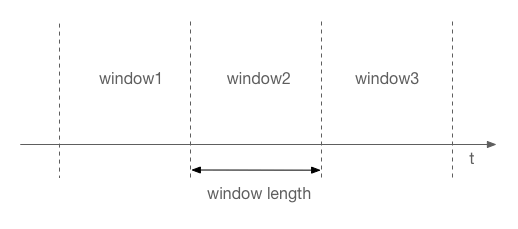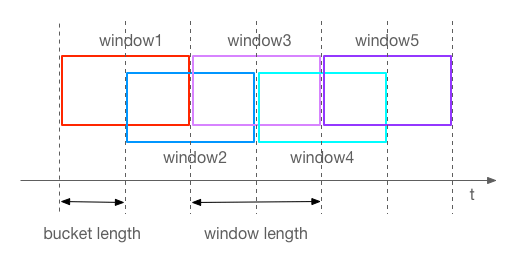本文参考两个使用Redis做限流的项目,分析分布式系统限流服务的实现,包括固定窗口以及滚动窗口的限流。
参考项目
- Istio项目
mixer模块的adapter/redisquota - go-redis/redis_rate
固定窗口

go-redis/redis_rate
redis_rate使用窗口标识做key的字符串,用INCRBY统计窗口已使用流量n,且key在此窗口结束后自动过期。
窗口标识的生成:
slot=utime(时间戳s)➗udur(窗口大小s,dur ≥ 1s)key=name+slot
utime与系统时钟相关,考虑一种较为极端的情况,窗口大小1s,A、B两个系统时钟差2s,而key的过期时间与窗口大小相同1s, 假设key在窗口最后有更新则key的生存周期是2s,而恰好时钟相差2s,这样A、B系统的分布式限流就变成了单机限流。
虽然比较极端,但在使用时还是需要注意,根据需要可以适当加大key的过期时间,同时存活多个窗口,使存活窗口范围覆盖系统间的时钟误差。
func (l *Limiter) AllowN(
name string, maxn int64, dur time.Duration, n int64,
) (count int64, delay time.Duration, allow bool) {
udur := int64(dur / time.Second)
utime := time.Now().Unix()
slot := utime / udur
delay = time.Duration((slot+1)*udur-utime) * time.Second
if l.Fallback != nil {
allow = l.Fallback.Allow()
}
name = allowName(name, slot)
count, err := l.incr(name, dur, n)
if err == nil {
allow = count <= maxn
}
return count, delay, allow
}
adapter/redisquota/fixed_window
redisquota使用lua脚本实现,设计上使用一个带有token和expire的哈希表,key过期时间为windowLength,窗口在key过期或timestamp≥expire时重置。
另外redisquota根据场景做了幂等设计,同一deduplicationid在窗口有效期内不会重新分配token
因为
timestamp与系统时钟相关,同样假设A、B两个系统时钟差2s(A>B),窗口大小10s,如果窗口①由A系统时间戳触发,而窗口②由B系统时间戳触发(A在后2s没有流量), 这样①实际窗口大小就是12s,这样继续到窗口③由A系统时间戳触发,②的实际窗口代销就是8s,所以在分布式环境下限流效果同样受系统时钟误差的影响。
local key_meta = KEYS[1]
-- local key_data = KEYS[2]
local credit = tonumber(ARGV[1])
local windowLength = tonumber(ARGV[2])
-- local bucketLength = tonumber(ARGV[3])
local bestEffort = tonumber(ARGV[4])
local token = tonumber(ARGV[5])
local timestamp = tonumber(ARGV[6])
local deduplicationid = ARGV[7]
-- lookup previous response for the deduplicationid and returns if it is still valid
--------------------------------------------------------------------------------
if (deduplicationid or '') ~= '' then
local previous_token = tonumber(redis.call("HGET", deduplicationid .. "-" .. key_meta, "token"))
local previous_expire = tonumber(redis.call("HGET", deduplicationid .. "-" .. key_meta, "expire"))
if previous_token and previous_expire then
if timestamp < previous_expire then
return {previous_token, previous_expire - timestamp}
end
end
end
-- read or initialize meta information
--------------------------------------------------------------------------------
local info_token = tonumber(redis.call("HGET", key_meta, "token"))
local info_expire = tonumber(redis.call("HGET", key_meta, "expire"))
if (not info_token or not info_expire) or (timestamp >= info_expire) then
info_token = 0
info_expire = windowLength + timestamp
redis.call("HMSET", key_meta, "token", info_token, "expire", windowLength + timestamp)
-- set the expiration time for automatic cleanup
redis.call("PEXPIRE", key_meta, windowLength / 1000000)
end
if info_token + token > credit then
if bestEffort == 1 then
local exceeded = info_token + token - credit
if exceeded < token then
-- return maximum available allocated token
redis.call("HMSET", key_meta, "token", credit)
-- save current request and set expiration time for auto cleanup
if (deduplicationid or '') ~= '' then
redis.call("HMSET", deduplicationid .. "-" .. key_meta, "token", token - exceeded, "expire", info_expire)
redis.call("PEXPIRE", deduplicationid .. "-" .. key_meta, math.floor((info_expire - timestamp) / 1000000))
end
return {token - exceeded, info_expire - timestamp}
else
-- not enough available credit
return {0, 0}
end
else
-- not enough available credit
return {0, 0}
end
else
-- allocated token
redis.call("HMSET", key_meta, "token", info_token + token)
-- save current request and set expiration time for auto cleanup
if (deduplicationid or '') ~= '' then
redis.call("HMSET", deduplicationid .. "-" .. key_meta, "token", token, "expire", info_expire)
redis.call("PEXPIRE", deduplicationid .. "-" .. key_meta, math.floor((info_expire - timestamp) / 1000000))
end
return {token, info_expire - timestamp}
end
Lua脚本获取时间戳
既然在分布式环境系统时钟有可能存在误差,那自然考虑将时间戳转到Redis中获取,消除时钟误差对窗口的影响,这里有一个限制条件是需要Lua脚本支持随机写入,
有关Redis Lua脚本随机写入请参考此文《redis4.0之Lua脚本新姿势》,结合这个特性可以将两个方案的时间戳由外部传入改为在Lua脚本中获取Redis系统时间,
我在hb-go/pkg/rate包分别使用SET、HSET做了实现可以参考。
-- Redis version ≥ 3.2
redis.replicate_commands()
local now = redis.call('TIME')
timestamp = (tonumber(now[1]) * 1e6 + tonumber(now[2])) * 1e3
滚动窗口

滚动窗口在固定窗口基础上,将一个window拆成多个bucket,这样窗口根据bucket的大小向前移动。Redis的结构为哈希表:token、bucket.token、bucket.timestamp和key,
以及一个存储bucket历史数据的有序集合(以bucket的时间戳排序)
token:窗口内已使用token数bucket.token:当前桶内已使用token数bucket.timestamp:当前桶的时间戳key:累计bucket数量
local key_meta = KEYS[1]
local key_data = KEYS[2]
local credit = tonumber(ARGV[1])
local windowLength = tonumber(ARGV[2])
local bucketLength = tonumber(ARGV[3])
local bestEffort = tonumber(ARGV[4])
local token = tonumber(ARGV[5])
local timestamp = tonumber(ARGV[6])
local deduplicationid = ARGV[7]
-- lookup previous response for the deduplicationid and returns if it is still valid
--------------------------------------------------------------------------------
if (deduplicationid or '') ~= '' then
local previous_token = tonumber(redis.call("HGET", deduplicationid .. "-" .. key_meta, "token"))
local previous_expire = tonumber(redis.call("HGET", deduplicationid .. "-" .. key_meta, "expire"))
if previous_token and previous_expire then
if timestamp < previous_expire then
return {previous_token, previous_expire - timestamp}
end
end
end
-- read meta information
--------------------------------------------------------------------------------
local info_token = tonumber(redis.call("HGET", key_meta, "token"))
local info_bucket_token = tonumber(redis.call("HGET", key_meta, "bucket.token"))
local info_bucket_timestamp = tonumber(redis.call("HGET", key_meta, "bucket.timestamp"))
-- initialize meta
--------------------------------------------------------------------------------
if not info_token or not info_bucket_token or not info_bucket_timestamp then
info_token = 0
info_bucket_token = 0
info_bucket_timestamp = timestamp
redis.call("HMSET", key_meta,
"token", info_token,
"bucket.token", info_bucket_token,
"bucket.timestamp", info_bucket_timestamp,
"key", 0)
end
-- move buffer to bucket list if bucket timer is older than bucket window
--------------------------------------------------------------------------------
if (timestamp - info_bucket_timestamp + 1) > bucketLength then
if tonumber(info_bucket_token) > 0 then
local nextKey = redis.call("HINCRBY", key_meta, "key", 1)
local value = tostring(nextKey) .. "." .. tostring(info_bucket_token)
redis.call("ZADD", key_data, info_bucket_timestamp, value);
end
redis.call("HMSET", key_meta,
"bucket.token", 0,
"bucket.timestamp", timestamp)
end
local time_to_expire = timestamp - windowLength
-- reclaim tokens from expired records
--------------------------------------------------------------------------------
local reclaimed = 0
local expired = redis.call("ZRANGEBYSCORE", key_data, 0, time_to_expire)
for idx, value in ipairs(expired) do
reclaimed = reclaimed + tonumber(string.sub(value, string.find(value, "%.")+1))
end
-- remove expired records
--------------------------------------------------------------------------------
redis.call("ZREMRANGEBYSCORE", key_data, 0, time_to_expire)
-- update consumed token
--------------------------------------------------------------------------------
if reclaimed > 0 then
info_token = info_token - reclaimed;
if info_token < 0 then
info_token = 0
end
redis.call("HSET", key_meta, "token", info_token)
end
-- update the expiration time for automatic cleanup
--------------------------------------------------------------------------------
redis.call("PEXPIRE", key_meta, windowLength / 1000000)
redis.call("PEXPIRE", key_meta, windowLength / 1000000)
-- calculate available token
--------------------------------------------------------------------------------
local available_token = credit - info_token
-- check available token and requested token
--------------------------------------------------------------------------------
if available_token <= 0 then
-- credit exhausted
return {0, 0}
elseif available_token >= token then
-- increase token and bucket.token by token
redis.call("HINCRBY", key_meta, "token", token)
redis.call("HINCRBY", key_meta, "bucket.token", token)
-- save current request and set expiration time for auto cleanup
if (deduplicationid or '') ~= '' then
redis.call("HMSET", deduplicationid .. "-" .. key_meta, "token", token, "expire", timestamp + windowLength)
redis.call("PEXPIRE", deduplicationid .. "-" .. key_meta, windowLength / 1000000)
end
return {token, windowLength}
else
if bestEffort == 0 then
-- not enough token
return {0, 0}
end
-- allocate available token only
redis.call("HINCRBY", key_meta, "token", available_token)
redis.call("HINCRBY", key_meta, "bucket.token", available_token)
-- save current request and set expiration time for auto cleanup
if (deduplicationid or '') ~= '' then
redis.call("HMSET", deduplicationid .. "-" .. key_meta, "token", available_token, "expire", timestamp + windowLength)
redis.call("PEXPIRE", deduplicationid .. "-" .. key_meta, windowLength / 1000000)
end
return {available_token, windowLength}
end
限流的窗口与Flink的Window类似, 对于固定窗口结合使用场景的需求,可以借鉴Flink的Tumbling Window接口设计提供
offset